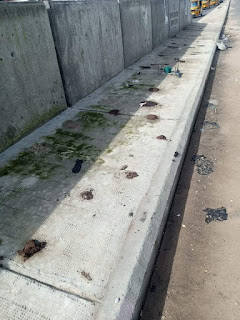From Fly Over To ‘Public Toilet’: ‘Disgusting Sights, Offence Smells On Gov. Ishaku’s Signature Project’
A cross section of residents in Jalingo has decried the increasing rate of open defecation across major streets in the state capital, Hebrews Iseac Wubon writes.
The ongoing Flyover Project and Pedestrian bridges in Jalingo which are the signature of Governor Darius Ishaku's administration is fast becoming a source of environmental concern as some residents have converted the flyover project into their public toilet where they defecate now.
Residents who spoke to Taraba Truth and Facts Newspaper lamented that even the just constructed Flyover at Road Block junction which is yet to be commissioned has now become a "public toilet" to some people.
"We are shocked that people go to defect on the flyover, many motorist are even avoiding using the flyover because of the disgusting sights of defecations littering the place. There also this offensive smells on the bridge," Useni Adamu said.
A business owner along the Road Block, a major business hub within Jalingo city said, " most at times, we see some hawkers, motorists, pedestrians and even people living around here go to the fly over road to defecate. They mostly do that at night and sometimes even in the day time because not many people within the city often use the road".
He opined that part of what contribute to open defection is due to Lack or shortage of public toilets in strategic places within Jalingo where citizens can run to, when they are pressed. He noted that even where the very few ones are available, there is virtually no sanitary compliance.
Mr Jerry Oliver on his part appeals to the Taraba state government to take measures to stop this open defecation before 'we experience cholera outbreak in Jalingo metropolis.'
While poverty and inadequate access to water are contributors to open defecation in Jalingo, the inability to include toilets in plans of some commercial buildings around the area is a major contributor to defect.
According to the World Health Organisation ( WHO), the effects of open defecation on human health include increase in water born diseases such as diarrhea and other problems associated with ingestion, vector born diseases such as cholera, malnutrition in children, child stunting, visual and olfactory pollution.
Residents however argued that there is no amount of reasons that can justify open defecation which places the lives of millions of people at risk.
The residents who spoke to Taraba Truth and Facts Newspaper however, appealed to the state government to set up a taskforce that will arrest and fine anyone caught defecating on the fly over or major streets in the state capital.
They also advised that the Taraba state House of Assembly should enact laws that would allow the setting up of mobile courts to try and prosecute those who are bent on giving the state capital a bad image by defecating on the streets.
The residents charged the ministry of environment to live up to its responsibility and ensure the state capital is kept clean. They also mentioned the need for the government to provide public toilets in designated places to prevent open defection.
"The prevention of open defecation requires self discipline by individuals and sensitization by environmental health workers through the ministry of health on the dangers of such practice.
"Community and religious leaders should also be actively involved in the sensitization process as the people are more answerable and loyal to them", Aminu Yaro told this newspaper.
According to a 2020 journal article, Taraba has an open defecation rate of 52.5%, much higher than the national average rate of 37%. The state's sanitary facilities and services, such as "safe, sanitary disposal of human waste, hand washing and water supply facilities," are basically non-existent.
Along with the State Water Sanitation and Hygiene bill, which aimed to improve the state's access and use of clean water, in 2019, Governor Darius Ishaku of Taraba urged his people to "engage in proper disposal of solid waste" and "cleaning of teeth and bathing at least once a day," among other improved sanitation and hygiene practices.
Many residents in the state however appealed to the Taraba State Government to impose a State Environmental Day monthly, up to 2009, the state had imposed a Sanitation Day every month to encourage citizens to engage in sanitary practices and clean-ups.
|
The State Environmental Day aims to set aside time for citizens of the state to take part in clean-ups to address some of the environmental problems Taraba faces, Mrs Rejoice Bala of the Clean Up Taraba, a civil society group believes that this will help Taraba engage in the three Rs of waste management: Reduce, reuse and recycle — crucial steps for preserving the environment.










No comments